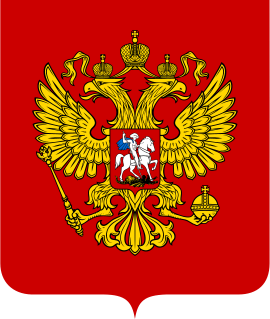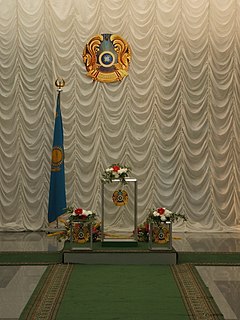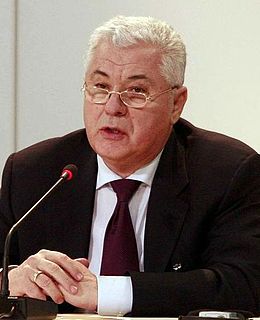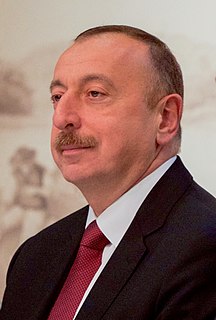
The Politics of Azerbaijan takes place in a framework of a semi-presidential republic, with the President of Azerbaijan as the head of state, and the Prime Minister of Azerbaijan as head of government. Executive power is exercised by the president and the government. Legislative power is vested in both the government and parliament. The Judiciary is nominally independent of the executive and the legislature. The state system of Azerbaijan defines the Constitution of the Republic of Azerbaijan. According to the constitution, Azerbaijan is a democratic, secular, unitary republic.

Robert Kocharyan is an Armenian politician who served as the second President of Armenia between 1998 and 2008. He was previously President of Nagorno-Karabakh from 1994 to 1997 and Prime Minister of Armenia from 1997 to 1998. He was arrested on December 7, 2018.

On the federal level, Russia elects a president as head of state and a legislature, one of the two chambers of the Federal Assembly. The president is elected for, at most, two consecutive six-year terms by the people. The Federal Assembly has two chambers. The State Duma has 450 members, elected for five-year terms, using a system of proportional representation, where parties gain a percentage of seats equal to the percentage of national votes they gained, with a 7% threshold required to gain any seats in the Duma. The Federation Council is not directly elected; each of the 85 federal subjects of Russia sends 2 delegates to the Federal Council, for a total of 170 members.

Presidential elections were held in Azerbaijan on 15 October 2003. As expected, Ilham Aliyev, son of the outgoing president, Heydar Aliyev, was easily elected in an election which international observers held not to be free or fair.

Elections in Kazakhstan are held on a national level to elect a President and the Parliament, which is divided into two bodies, the Majilis and the Senate. Local elections for maslikhats are held every five years.
The OSCE Minsk Group was created in 1992 by the Conference on Security and Cooperation in Europe to encourage a peaceful, negotiated resolution to the conflict between Azerbaijan and Armenia over Nagorno-Karabakh.

The Ukrainian presidential election of 2010 was Ukraine's fifth presidential election since declaring independence from the Soviet Union in 1991. The first round was held on January 17, 2010. The run-off between Prime Minister Yulia Tymoshenko and opposition leader Viktor Yanukovych followed on February 7, 2010.

A presidential election was held in Azerbaijan on 15 October 2008. Ilham Aliyev of the New Azerbaijan Party was re-elected with 87% of the votes, according to official results. Several major political parties, including Musavat, the Azerbaijan Popular Front Party, Azerbaijan Liberal Party, and the Azerbaijan Democratic Party boycotted the vote because of alleged poll-fixing and oppression of political opponents.

The Ukrainian parliamentary election of 2012 took place on 28 October 2012. Because of various reasons, including the "impossibility of announcing election results" various by-elections have taken place since. Hence, several constituencies have been left unrepresented at various times.

Parliamentary elections were held in Moldova on 5 April 2009. The Party of Communists of the Republic of Moldova (PCRM) won a majority of seats for the third consecutive occasion. Turnout was 59%, exceeding the 50% necessary for the election to be valid.
Parliamentary elections were held in Azerbaijan on 7 November 2010.

Presidential elections were held in Ukraine on 25 May 2014, resulting in Petro Poroshenko being elected President of Ukraine. Originally scheduled to take place on 29 March 2015, the date was changed following the 2014 Ukrainian revolution. Poroshenko won the elections with 54.7% of the votes, enough to win in a single round. His closest competitor was Yulia Tymoshenko, who emerged with 12.81% of the votes. The Central Election Commission reported voter turnout at over 60% excluding those regions not under government control. Since Poroshenko obtained an absolute majority in the first round, a run-off second ballot was unnecessary.

Early presidential elections were held in Kazakhstan on 3 April 2011, having been originally scheduled for 2012.

Presidential elections were held in Georgia on 27 October 2013, the sixth presidential elections since the country's restoration of independence from the Soviet Union in 1991. The last elections in January 2008 resulted in the re-election of Mikheil Saakashvili for his second and final presidential term. Saakashvili was constitutionally barred from running for a third consecutive term.

Presidential elections were held in Azerbaijan on 9 October 2013. The result was a victory for incumbent President Ilham Aliyev, who received 84.5% of the vote, whilst leading opposition candidate Jamil Hasanli finished second with 5.5% of the vote.

Presidential elections were held in Egypt between 26 and 28 March 2018, though Egyptians abroad voted from 16 to 18 March 2018. On 19 January, incumbent President Abdel Fattah el-Sisi formally announced he would run for a second and final term. A runoff, if necessary, would take place 19 to 21 April outside the country and 24 to 26 April within the country. 14 human rights groups dismissed the poll as "farcical". They said the authorities had "trampled over even the minimum requirements for free and fair elections", stifling basic freedoms and eliminating key challengers.

Ilham Aliyev is the 4th President of the Republic of Azerbaijan. His presidency began in 2003, after what he was twice (2008,2013) elected to the post of President of the country.






















